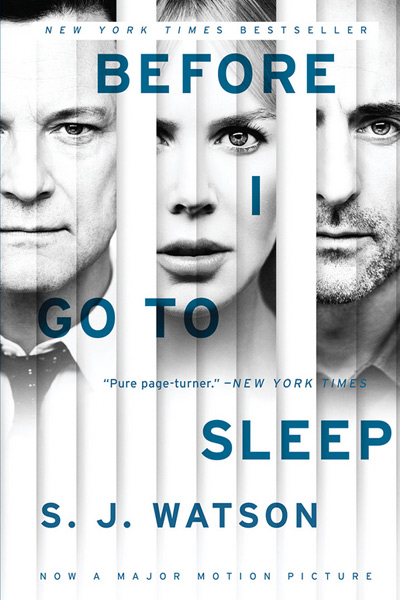Why You Should Read Before I Go to Sleep Before It Hits Theaters
 Sleep, for most of us, is the perfect ally. There’s no one I’d rather see at the end of a long day than Mr. Sandman. But what if the peace of slumber was the enemy—what if it wreaked havoc with your waking hours? That’s the premise of S.J. Watson’s delightfully nimble and twisty Before I Go to Sleep, in which poor, beleaguered Christine Lucas loses her memories every time she hits the sheets.
Sleep, for most of us, is the perfect ally. There’s no one I’d rather see at the end of a long day than Mr. Sandman. But what if the peace of slumber was the enemy—what if it wreaked havoc with your waking hours? That’s the premise of S.J. Watson’s delightfully nimble and twisty Before I Go to Sleep, in which poor, beleaguered Christine Lucas loses her memories every time she hits the sheets.
Because of anterograde amnesia, caused by some initially unexplained trauma, Christine wakes each day with no memory of who she is. She also lacks the ability to form new memories, so each day is a blank slate. In the realm of unreliable narrators, one who doesn’t even understand her own identity takes the cake. On October 31, Christine’s plight hits the big screens with Nicole Kidman and Colin Firth in the roles of Christine and husband Ben, which means it’s sure to be a well-acted psychological thrill.
But as we the bookish know, cinema can’t always capture the full, nuanced magic of a novel, let alone one this suspenseful and unusual. So it’s a grand idea to steal some time to plow through Watson’s book before heading down to the multiplex. Why? Glad you asked. Here’s why you’ve got read Before I Go to Sleep:
It takes you inside the head of an unreliable narrator
Because of the nature of Christine’s infirmity, much of the action takes place inside her head. We’re on this roller coaster with her each day as she tries to piece together a life she has no recollection of. All she has to go on is what her husband, Ben, tells her, and the things she’s written in her secret journal. The reader is not omniscient here; you know only as much as Christine does (though you, at least, can remember what she’s learned), which makes each page masterfully mysterious.
It plumbs 50 shades of suspicious gray
One exciting aspect of Before I Go to Sleep is just how little you can trust anyone. Christine relies on what she’s told from the two people she interacts with: Ben and her therapist, Dr. Nash. Their versions—including exactly what “accident” caused her trauma—don’t always align. So from the very first chapter—well, really, the back cover of the book—you don’t know who to believe. No matter the depth of the acting taking place on the big screen, only a book can harness that level of moral ambiguity. Not to mention, it’s hard not to trust Colin Firth’s face, whether or not you should.
You can follow the clues when you do watch the movie
The first time I watched The Sixth Sense, I was so gobsmacked by the ending, I immediately rewatched to find all the hints I’d missed. Granted, I was around 10, and no movie since has had that same effect on me. Watson delivers a similar shock, and it’s deliciously fun to return for a second read after watching to find all the signs you might have missed, or at least misinterpreted, without them being lit up in blinking neon for you on the big screen.
You’ll enjoy its fine prose
Of course, the number-one reason to read before you watch is that it’s a darn good book, from disorienting beginning to surprising end. Few words are wasted, especially when it comes to Christine’s journal entries, which prove a must-read within a must-read.
Before I Go to Sleep is available now.